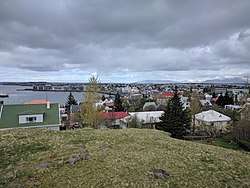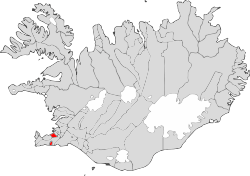Hafnarfjörður
Hafnarfjörður is a port town and municipality located on the southwest coast of Iceland, about 10 km (6 mi) south of Reykjavík.
| Hafnarfjörður | |
|---|---|
 May 2017 view over Hafnarfjörður's town center | |
 Coat of arms of Hafnarfjörður | |
 Location of the municipality | |
| Region | Capital Region |
| Constituency | Southwest Constituency |
| Mayor | Rósa Guðbjartsdóttir |
| Area | 143 km2 (55 sq mi) |
| Population | 29,971 (2020)[1] |
| Density | 208.38/km2 (539.7/sq mi) |
| Municipal number | 1400 |
| Postal code(s) | 220, 221, 222 |
| Website | hafnarfjordur |
It is the third-most populous city in Iceland, after Reykjavík and Kópavogur. Hafnarfjörður has established local industry and a variety of urban activities, with annual festival events.
Activities
The town is the site of an annual Viking festival, where Viking culture enthusiasts from around the world display reconstructions of Viking garb, handicraft, sword-fighting and longbow shooting. It takes place in June each summer.
Local industry
Just two kilometres (1.2 miles) outside of Hafnarfjörður is an aluminium smelter, run by Alcan. The smelter was originally built in 1969, and it has improved its cleaning process since then, especially regarding fluoride. Local elections were held in May 2006, where the people of the town voted against extension of the smelter.
History
| 1910 | 1,547 |
|---|---|
| 1920 | 2,366 |
| 1930 | 3,591 |
| 1940 | 3,686 |
| 1950 | 5,087 |
| 1960 | 7,160 |
| 1970 | 9,696 |
| 1980 | 12,205 |
| 1990 | 15,151 |
| 2000 | 19,640 |
| 2010 | 25,913 |
| 2015 | 28,200 |
Hafnarfjörður takes its name (meaning harbour fjord) from the area's excellent natural harbour. The town is first named in the medieval Landnámabók, and the earliest reports of voyages to Hafnarfjörður date from the end of the 14th century. Englishmen began trading in Hafnarfjörður in the 15th century, but German merchants followed in their wake and eventually drove the English out. The first Lutheran church in Iceland was raised at Háigrandi, opposite Óseyri, just outside the small boat harbour in 1533. After that, the Hanseatic traders prevailed in town until 1602, based at Hvaleyri. At this point, the Danish monarchy established a Danish trade monopoly in Iceland which lasted until late in the 18th century. During this period, Hafnarfjörður was the nation's busiest trade centre.
In 1793, Bjarni Sívertsen settled here and became influential in local business and international trade, setting up a major commercial fishing operation. His enterprise and initiative signalled the start of impressive commerce in the town. Ever since, he has been called "the father of Hafnarfjörður" and nicknamed "Sir Bjarni". Around 1870, dramatic changes took place in Icelandic fishing. Residents followed the growing trend in Iceland of using decked boats rather than row-boats. This led to even more employment and rapid growth, and Hafnarfjörður attained official municipal status in 1908. The first mayor was Páll Einarsson, who later became the mayor of Reykjavík. The first road between Reykjavík and Hafnarfjörður was finished in 1898. The first hydrological power plant in Iceland was built in Hafnarfjörður in 1904.
The Coot, Iceland's first trawler, operated from Hafnarfjörður between 1905 and 1908.[2] Its boiler stands by the roundabout on the junction of Reykjavíkurvegur, Strandgata and Vesturgata. A harbour for large commercial ships was raised in 1912, and the first car arrived in 1913.
After World War II, more advanced trawlers and numerous motorised ships were added to the fleet. The town's first stern trawler appeared in 1973. Today, Hafnarfjörður is one of the nation's largest fishing centres and the site of Iceland's first fish wholesalers' auction market. Through the years, Hafnarfjörður's dynamic local economy has been strongly linked to fishing, although freight transport has recently become the major harbour activity. And now, the town is Iceland's second-ranked import and export harbour.
Geography
Climate
The climate in Hafnarfjörður is subpolar oceanic climate (Köppen Cfc).
| Climate data for Hafnarfjörður (1981-2010 normals) | |||||||||||||
|---|---|---|---|---|---|---|---|---|---|---|---|---|---|
| Month | Jan | Feb | Mar | Apr | May | Jun | Jul | Aug | Sep | Oct | Nov | Dec | Year |
| Record high °C (°F) | 15.9 (60.6) |
12.5 (54.5) |
16.0 (60.8) |
17.0 (62.6) |
21.4 (70.5) |
23.7 (74.7) |
23.8 (74.8) |
24.5 (76.1) |
19.7 (67.5) |
14.5 (58.1) |
16.0 (60.8) |
12.9 (55.2) |
24.5 (76.1) |
| Average high °C (°F) | 3.0 (37.4) |
3.1 (37.6) |
3.8 (38.8) |
6.3 (43.3) |
9.5 (49.1) |
11.8 (53.2) |
13.4 (56.1) |
13.3 (55.9) |
10.7 (51.3) |
7.2 (45.0) |
4.6 (40.3) |
3.3 (37.9) |
7.5 (45.5) |
| Daily mean °C (°F) | 0.4 (32.7) |
0.5 (32.9) |
1.2 (34.2) |
3.6 (38.5) |
6.7 (44.1) |
9.2 (48.6) |
10.9 (51.6) |
10.7 (51.3) |
8.1 (46.6) |
4.8 (40.6) |
2.2 (36.0) |
0.7 (33.3) |
4.9 (40.9) |
| Average low °C (°F) | −2.1 (28.2) |
−2.0 (28.4) |
−1.5 (29.3) |
0.8 (33.4) |
3.8 (38.8) |
6.6 (43.9) |
8.4 (47.1) |
8.0 (46.4) |
5.4 (41.7) |
2.4 (36.3) |
−0.3 (31.5) |
−1.8 (28.8) |
2.3 (36.2) |
| Record low °C (°F) | −15.3 (4.5) |
−12.2 (10.0) |
−18 (0) |
−10 (14) |
−6 (21) |
−1 (30) |
1.9 (35.4) |
1.4 (34.5) |
−5.5 (22.1) |
−7.2 (19.0) |
−10.7 (12.7) |
−17 (1) |
−18 (0) |
| Average precipitation mm (inches) | 141.7 (5.58) |
136.4 (5.37) |
119.9 (4.72) |
77.6 (3.06) |
77.4 (3.05) |
72.1 (2.84) |
77.1 (3.04) |
112.3 (4.42) |
122.6 (4.83) |
159.9 (6.30) |
121.3 (4.78) |
143.6 (5.65) |
1,361.9 (53.64) |
| Source: Météo Climat[3][4] | |||||||||||||
Local festivals
Bright days
Each year in May, the Bright Days festival is held. The events include short movies, concerts and usually conclude on a day commemorating the sailors of Iceland.
Viking festival
Each year on the summer solstice a Viking festival is held in Hafnarfjörður. A local pub and restaurant, Fjörukráin, started the festival and maintains it to this day.
Swimming pools
Hafnarfjörður has three swimming pools, despite its low population. This is common for any town in Iceland, due to the geothermal energy.
Twin towns – sister cities
Sports
There are two major sport clubs in Hafnarfjörður the first being Fimleikafélag Hafnarfjarðar (FH). Its men's and women's football teams have won several national championships. FH have won the Icelandic Handball league in total of 25 times and have won the cup 6 times which makes them the most successful team competing in Icelandic handball.
The second club is Knattspyrnufélagið Haukar. Haukar have a magnificent history in handball with many titles. Haukar were champions in 1943, 2000, 2001, 2003, 2004, 2005, 2008, 2009, 2010 and 2015 and cup holders in 1980, 1997, 2001, 2002 and 2010.
Hafnarfjörður also has a gymnastics club, Fimleikafélagið Björk, established on 1 July 1951.
Local swimming club, Sundfélag Hafnarfjarðar (SH), was established on 19 June 1945. The triathlon club 3SH, is part of the club.
Keilir Golf Club is an 18-hole golf club and course located on the Hvaleyri peninsula.
In popular culture
In the 1986 novel Red Storm Rising by Tom Clancy, the Soviet Union gains a dramatic strategic advantage at the beginning of the war by seizing Iceland with a Guards Airborne division transported secretly by converted freighters. When the US Marine Corps retake Iceland, they initially land at Hafnarfjörður before advancing on Keflavik. Additionally, in the novella, The Odd Saga of the American and a Curious Icelandic Flock,[6] Snorri calls Alex in the middle of the night to tell him that he is passing through Hafnarfjörður and will be picking him up shortly for a trip to Snæfellsnes.
In 2017 a petition calling upon the Icelandic Prime Minister to erect a statue of Stefán Karl Stefánsson in his hometown of Hafnarfjörður “to forever immortalize and honor his amazing legacy” was created. After his death in 2018, there was a surge of signatures. There are now over 450,000 signatures.[7]
Notable people
- Ólafía Einarsdóttir, first Icelander to earn a degree in archaeology
- Sveinn Eythorsson, guitarist and software developer
- Logi Geirsson, former handballer
- Ragnheiður Gestsdóttir, children's book author
- Rebekka Guðleifsdóttir, photographer, artist
- Ólafur Guðmundsson, handball player
- Hildur Guðnadóttir, Academy Award-winning composer
- Björgvin Halldórsson, musician
- Emil Hallfreðsson, footballer who plays for Serie A club Udinese
- Geir Hallsteinsson, former handballer
- Indie band Jakobínarína are from here
- Jóhanna Guðrún Jónsdóttir (Yohanna) was born in Copenhagen but raised in Hafnarfjörður, she was chosen to represent Iceland at the Eurovision Song Contest 2009 in Moscow, Russia with the song "Is It True?", earning her 2nd place
- Current home to Magnús Ver Magnússon
- Aron Pálmarsson, handballer in THW Kiel
- Sesselja Sigmundsdóttir (born Hafnarfjörður 5 July 1902)
- Gylfi Sigurðsson, footballer currently plays for English club Everton in the Premier League
- Sóley (musician), indie pop singer-songwriter
- Stefán Karl Stefánsson, actor, most known for his role as Robbie Rotten on the Icelandic children's TV series, LazyTown
See also
- List of cities and towns in Iceland
References
- "Population by municipalities, sex and age 1 January 1998-2020 - Current municipalities". PX-Web. Retrieved 7 April 2019.
- "Iceland: The Trawler Coot". Stampnews.com. 13 March 2004. Archived from the original on 25 August 2016. Retrieved 18 June 2016.
- "Météo climat stats for Islande". Météo Climat. Retrieved 11 November 2019.
- "Météo climat stats for Hornafjordur (records)". Météo Climat. Retrieved 11 November 2019.
- "Vinabærinn". hafnarfjordur.is (in Icelandic). Hafnarfjörður. Retrieved 12 February 2020.
- "The Odd Saga of the American and a Curious Icelandic Flock". Google Books. Retrieved 5 May 2012.
- grapevine.is (23 August 2018). "Petition Circulating Calling For A Statue Of Stefán Karl Stefánsson In His Home Town - The Reykjavik Grapevine". Retrieved 12 September 2018.
External links
| Wikimedia Commons has media related to Hafnarfjörður. |

- Official website (in Icelandic)
